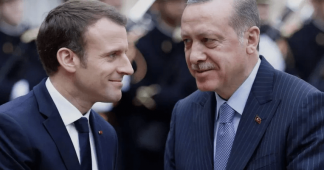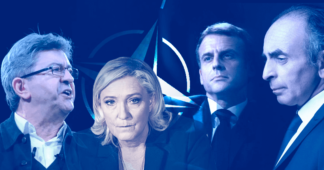Mar 07, 2022
Jean-Luc Melenchon, a far-left French presidential candidate on Sunday called for leaving NATO, an organization which he labeled as useless on Twitter. Melenchon is not the only candidate questioning the transatlantic bloc. French far-right presidential candidate Eric Zemmour in December also expressed that he wanted to withdraw France from NATO. Furthermore, Marine Le Pen, another far-right presidential candidate, announced in February that France will leave NATO if she wins the elections.
Three of the five leading French presidential candidates are critics of the US-led transatlantic alliance. France’s reasons for wanting to leave NATO are not groundless. France has always pursued strategic autonomy. Former French president Charles de Gaulle withdrew French forces from NATO’s command in 1966 at the height of the Cold War and expelled the alliance’s headquarters from Paris and Fontainebleau the following year in protest of what he saw as US hegemony in Europe. French incumbent President Emmanuel Macron has also expressed disappointment toward the bloc. In an interview with the Economist in 2019, Macron said, “What we are currently experiencing is the brain death of NATO.”
French presidential candidates’ call to leave NATO, to some extent, is in salute to president Charles de Gaulle who pursued France’s autonomous status of a major power as well as the diplomatic legacy of Gaullism. This has been the consensus of the French people for a long time. By voicing their concern, French presidential candidates may also cater to voters, gaining more support.
Meanwhile, calling to leave NATO from French presidential candidates also embodied that France has reflected the structural problems of NATO, and these problems have triggered skepticism toward the organization among many French. The bloc is ineffective in dealing with non-traditional security challenges. Furthermore, the US has pushed NATO allies to spend more on defense, which has caused much discontent. The bloc has also kidnapped the EU’s foreign policy and restricted its strategic autonomy.
France is a country with influence. It takes the initiative of diplomacy and defense into its own hands. It has built nuclear forces which are independent of its Western allies. It refuses to put all its security in the hands of US-led NATO. Against this backdrop, it is normal to hear French politicians voice skepticism toward the bloc.
Benjamin Norton, a Latin America-based observer tweeted on Monday that if one European country could challenge NATO, that country would be France.
France is the only nuclear power and member of the five permanent members of the UN Security Council within the EU.
It is also a major military power, with solid defense foundation, while other European countries have been more relying on NATO for defense construction and security guarantees. Successive generations of French leaders underlined the importance of independence and autonomy in defense, in sharp contrast to the attitude of many Central and Eastern European countries that place most of their hopes in NATO.
The withdrawal of any member would question NATO’s capabilities and solidarity, and would affect its so-called strategic credibility. In fact, the US and NATO have always tried to discourage Europe from getting rid of its security dependence. As a response to France’s skepticism toward NATO, the US is anticipated to exploit some pro-US countries within the EU to pressure France.
Due to the high tensions between Europe and Russia and the Ukrainian crisis, anti-Russian stance and deterrence and containment of Russia has become a kind of political correctness from the West. An unsteady stance on this issue will mean that France will encounter constraints and difficulties in the partnership between the US and the EU. It seems that no matter which candidate takes office, it will be difficult for France to pull out of NATO. At the same time, there are a considerable number of transatlanticists in French political and public opinion circles, which will also heavily hinder relevant initiatives to leave NATO.
* The author is a research fellow with the Institute of European Studies, China Institutes of Contemporary International Relations. opinion@globaltimes.com.cn
Published at www.globaltimes.cn
We remind our readers that publication of articles on our site does not mean that we agree with what is written. Our policy is to publish anything which we consider of interest, so as to assist our readers in forming their opinions. Sometimes we even publish articles with which we totally disagree, since we believe it is important for our readers to be informed on as wide a spectrum of views as possible.










